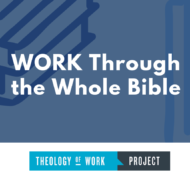61: Waiting for renewal (2 Peter 3:13–14)
Devotional / Produced by TOW Project
Scripture Reading: 2 Peter 3:13–14
Does our earthly work matter to God? Yes. Our work is ultimately valuable because the fruits of our labor, having been redeemed and transformed, will have a home in heaven. But 2 Peter 3 seems to call that into question. Peter is responding here to lawless scoffers who claimed that God would not intervene in history to judge evil (2 Pet. 3:3–4). He appears to describe a future that lacks all continuity with the present world.
Peter is using end-times imagery commonly found in Old Testament prophetic books to assure his readers of God’s impending judgment. The fire and melting imagery can be understood as a metaphor for the process in which God separates good from evil.
Peter’s reference to the flood of Noah’s time (2 Pet. 3:5–6) should caution us against reading “deluged” to mean total annihilation. The world did not cease to exist, but was purified of all humanity’s wickedness. Humanity’s goodness—limited to Noah, his family, their possessions, and their work of tending the animals on board—was preserved, and life resumed on the physical earth.
Peter’s positive vision of the ultimate future describes a renewal of the material order: “But, in accordance with his promise, we wait for new heavens and a new earth, where righteousness is at home” (2 Pet. 3:13). This is no thin, disembodied netherworld, but a new cosmos that contains both a “heaven” and an “earth.” All evil will be utterly consumed, but all that is righteous will find a permanent home in the new creation. Fire not only consumes, it purges. The dissolution does not signal the end of work. Rather, work done for God finds its true end in the new heavens and new earth.
Prayer: Jesus, Thank you that work done for you has eternal value. Amen.
For Further Exploration: Read 2 Peter: Work and New Creation from the Theology of Work Bible Commentary.
Popular Content
Popular Content
Table of Contents
-
Work Through the Whole Bible Devotional Plan
- 61: Waiting for renewal (2 Peter 3:13–14)
Donate
Copyright
Author: Theology of Work Project.
Theology of Work Project Online Materials by Theology of Work Project, Inc. is licensed under a Creative Commons Attribution-NonCommercial 4.0 International License. Based on a work at www.theologyofwork.org
You are free to share (to copy, distribute and transmit the work), and remix (to adapt the work) for non-commercial use only, under the condition that you must attribute the work to the Theology of Work Project, Inc., but not in any way that suggests that it endorses you or your use of the work.
© 2014 by the Theology of Work Project, Inc.
Unless otherwise noted, the Scripture quotations contained herein are from the New Revised Standard Version Bible, Copyright © 1989, Division of Christian Education of the National Council of the Churches of Christ in the U.S.A., and are used by permission. All rights reserved.





